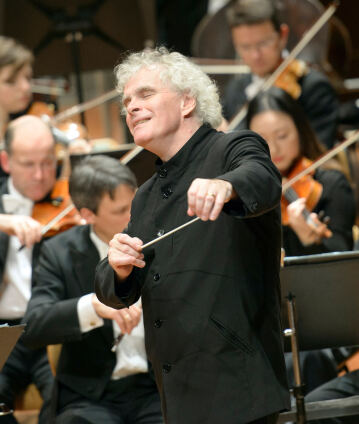First concert in the Brahms/Schumann cycle with Simon Rattle

Complete performances of the symphonies of Brahms and Schumann have been among the most outstanding events of the Simon Rattle era with the Berliner Philharmoniker. Here, the orchestra and conductor directly juxtaposed the symphonies of both composers, creating an intriguing double portrait. This concert, with Brahms’s and Schumann’s symphonic debuts, marks the beginning of the cycle.
When Robert Schumann presented Johannes Brahms to the music world as an exceptionally gifted pianist and composer of chamber music and lieder in his “New Paths” article in the Leipzig Neue Zeitschrift für Musik, he also pointed the way into a future full of hope for the young man, who was then 20 years old: “If he lowers his magic staff where the massed forces of chorus and orchestra give their powers, then we shall yet have even more wondrous glimpses into the secrets of the spiritual world. May the highest spirit of genius strengthen him for this.” Brahms, who made a pilgrimage to Düsseldorf in October 1853, responded rather diffidently: “God grant that my work soon give you proof of how very much your kindness lifted me.” The two of them agreed that the path to “great” symphonic writing would not be easy. Probably neither would have anticipated at that time, however, that more than 20 years were to pass until Brahms’s first symphony was completed. At that point Brahms, 43 years old, was the same age as Schumann when his compositional career broke off.
The remarkable parallels in the genres of the oeuvre of the two composers (each wrote three piano sonatas, three string quartets, three piano trios, three violin sonatas and four symphonies) makes it attractive to juxtapose them, as Sir Simon Rattle and the Berliner Philharmoniker are exploring in a cycle of their own. Unlike Schumann, whose ebullient First Symphony was “written in that springtime impulse which probably assails people every year anew,” Brahms’s First is a dark work in C minor that begins fatefully with a tremendous timpani ostinato; with its “Per aspera ad astra” Finale, it links to the Beethoven tradition.
© 2014 Berlin Phil Media GmbH
Related interviews